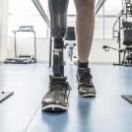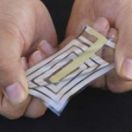SystemX Alliance News
Mon, 10/07/2019
By discerning patterns in satellite imagery, researchers hope to help national leaders and international agencies assist poverty-stricken regions.
Wed, 10/02/2019
Monika Schleier-Smith and Stanley Qi have been selected for Science News’ 2019 SN 10: Scientists to Watch list.
Mon, 09/23/2019
A mechanical engineer explains how more and better data is helping to create prosthetics unlike any before.
Mon, 08/26/2019
A Stanford-led research team invented a new coating that could finally make lightweight lithium metal batteries safe and long lasting, which could usher in the next generation of electric vehicles.
Fri, 08/16/2019
Stanford engineers have developed experimental stickers that pick up physiological signals emanating from the skin, then wirelessly beam these health readings to a receiver clipped onto clothing. It’s all part of a system called BodyNet.
Fri, 08/16/2019
Atomically thin materials developed by Stanford researchers could create heat shields for cell phones or laptops that would protect people and temperature-sensitive components and make future electronic gadgets even more compact.
Wed, 08/07/2019
A recipe for creating a microscopic crystal structure that can hold two wavelengths of light at once is a step toward faster telecommunications and quantum computers.
Tue, 08/06/2019
Birds can perch on a wide variety of surfaces, thick or thin, rough or slick. But can they find stable footing if a branch is covered in Teflon? In the interest of making better robots, Stanford researchers found out.
Tue, 07/30/2019
If a character in a virtual environment drops a plate, software can generate that sound at just the right time.
Mon, 07/29/2019
By analyzing single particles of light, this camera system can reconstruct room-size scenes and moving objects that are hidden around a corner. This work could someday help autonomous cars and robots see better.












